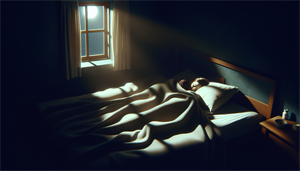If someone has flagged that you’re snoring but you never catch yourself in the act, it’s not just you. Many people wonder, “why can’t I hear myself snore?” and the answer is surprisingly simple: our brains are designed to ignore it.
This article delves into the sleep science that keeps us from registering our own snores, a feature that could be both a quirky brain quirk and a sign of deeper sleep health issues. Keep reading to learn why your snoring slips past your own ears.
Key Takeaways
-
The brain undergoes sensory adaptation during sleep, enabling people to sleep through familiar, low-priority noises such as their own snoring, only causing brief, often unnoticeable awakenings.
-
Chronic snoring can be an indicator of obstructive sleep apnea (OSA), a serious health condition with risks such as cardiovascular issues; symptoms include daytime sleepiness and mood swings, and sleep studies are crucial for diagnosis.
-
Several strategies can mitigate snoring and enhance sleep quality; these include weight loss, avoiding alcohol before bed, changing sleep position, and using anti-snoring devices, but professional consultation is advised.
The Silent Slumber Mystery: Unraveling Why Snorers Don't Wake Themselves

The answer lies in the intricate workings of our brain. When we sleep, our brain undergoes a process known as sensory adaptation. This process allows the brain to become accustomed to the sound of our own snoring. It filters out familiar, low-priority noises such as one’s own snoring, enabling us to stay in a restful state of sleep despite the noise.
But what happens when the snoring escalates to a crescendo? Interestingly, even very loud snores can only cause brief awakenings. As soon as snorers wake up, their brain swiftly ushers them back into the realm of deep sleep. These micro-arousals are often so fleeting that we don’t even notice them.
In the realm of sleep, our brain masterfully prioritizes restfulness. It disregards non-critical stimuli like low priority sounds, such as snoring, to ensure a peaceful state of slumber, placing restfulness above responding to familiar, low-risk sounds.
The Science Behind Not Hearing Your Own Loud Snores
The brain’s design, including the brain stem, enables it to prioritize tranquility during sleep. Brainwave research suggests that it accomplishes this by disregarding familiar, insignificant sounds, such as our own snoring, allowing us to continue sleeping soundly despite our loud snores.
The probability of awakening depends on the sound’s importance and loud sounds. Unfamiliar or significant stimuli elicit stronger brain responses, while frequent or known sounds generate weaker responses. This is why we might wake up to the sound of our alarm or a random word but sleep through the snoring.
Even the brief awakenings caused by loud snores often end with us quickly returning to sleep. Our brain, when in a deep sleep state, discards most stimuli as non-critical, enabling us to drift back into sleep regardless of the noise.
Sleep's Protective Mechanism: How Deep Sleep Shields Us from Our Noises
Deep sleep serves as a shield, screening all but the most crucial information. Consequently, we remain unaware of our own snoring. During deep sleep, our muscles relax, leading to vibrations of soft tissues in the mouth, causing snoring.
The most profound stage of sleep, marked by slow or Delta wave sleep, is vital for our growth and recovery. The intensity of sleep during this phase makes it less likely for external stimuli, like our own snoring, to wake us once we fall asleep.
Thus, deep sleep is not just a phase of rest but a fortress. It shields us from our own noises, ensuring that we sleep soundly and our sleep remains undisturbed.
Obstructive Sleep Apnea: When Snoring is More Than Just Noise

Yet, chronic snoring is not always harmless. It can be an indicator of a serious health condition called obstructive sleep apnea (OSA). OSA is a sleep disorder where breathing periodically stops and starts due to throat muscles intermittently relaxing and blocking the airway.
OSA is associated with an increased risk of:
-
cardiovascular and metabolic health issues, including heart disease, diabetes, and severe long-term health consequences like strokes and heart attacks
-
It affects individuals of all weights, but it is more prevalent among obese individuals and men
-
Women’s risk increases after menopause.
An effective first-line treatment for sleep apnea is the use of continuous positive airway pressure (CPAP) machines. These devices significantly improve health outcomes like blood pressure and reduce the risk of heart attack and stroke.
Recognizing the Signs of Sleep Apnea
Identifying the symptoms of sleep apnea is vital. Indicators such as:
-
feeling overly sleepy during the day
-
strained relationships due to snoring
-
gasping or choking while sleeping
-
morning headaches
-
mood swings
-
difficulty concentrating
If you’re a loud snorer, it might be time to consult a doctor regarding your snoring issues. You may wonder, why don’t snorers seek help sooner? Often, they are unaware of the severity of their snoring until someone else brings it to their attention.
If you find yourself feeling excessively sleepy during the day, despite getting ample sleep at night, it may be a red flag. Or if your partner has been complaining about your loud snoring, it’s time to take notice.
The impact on relationships due to snoring should not be overlooked either. It can lead to sleep disruption for others in the room, causing strain in relationships. Recognizing these symptoms and seeking medical consultation is of utmost importance.
The Importance of a Sleep Study
Conducting a sleep study is a fundamental step towards diagnosing sleep disorders like sleep apnea. During a sleep study, various factors are monitored, including:
-
Breathing patterns
-
Brain waves
-
Blood oxygen levels
-
Heart rate
-
Eye and leg movements
The study can reveal the number and duration of breathing interruptions, which help in determining the severity of sleep apnea. These studies can be conducted in a sleep center that resembles a hotel room with monitoring facilities, or at home using a simplified testing kit that records key data.
The data collected during a sleep study is initially evaluated by a technologist. After charting sleep stages and cycles, it is reviewed by a sleep specialist to determine the appropriate treatment or need for further evaluation.
Strategies to Stop Snoring and Improve Sleep Quality
Numerous strategies are available to lessen snoring and enhance sleep quality. Some of these strategies include:
-
Losing weight, as excess throat tissue contributes to obstruction
-
Avoiding alcohol and sedatives before bedtime to prevent muscle over-relaxation that leads to snoring
-
Quitting smoking
-
Ensuring adequate sleep
By implementing these strategies, you can reduce the likelihood of snoring and improve your sleep quality.
Adjusting your sleep position can also help. Here are some tips:
-
Sleep on your side rather than your back to prevent your tongue from blocking your throat.
-
Use an adjustable memory foam pillow to support optimal sleep posture and reduce snoring.
-
Elevate the head of your bed by 4 inches to aid in reducing snoring.
There are also anti-snoring devices available in the market that can improve airflow and reduce snoring. These include:
-
Internal nasal dilators
-
External nasal strips
-
Mandibular advancement devices
-
Tongue retaining devices
Nonetheless, it’s of paramount importance to seek advice from a healthcare professional before selecting a suitable anti-snoring device and tackling specific causes.
Decoding the Night: Why We Rarely Remember Waking Up to Snore
Even though it’s clear that our own snoring typically doesn’t wake us up, there’s another fascinating facet to this phenomenon. Why do we rarely remember waking up due to snoring? The answer lies in the nature of microarousals during sleep.
We can experience up to 25 microarousals per hour during sleep, which include brief awakenings possibly caused by our own loud snoring. These microarousals are typically so fleeting that they’re not consciously noticed.
During REM sleep, the brain can selectively gate incoming sensory stimuli based on their content. This may prevent meaningful stimuli such as loud snoring from eliciting a conscious response or awakening. Even awakenings caused by very loud snores are often not remembered due to the rapid return to sleep.
Snoring Mouthpieces and Better Sleep
Snoring mouthpieces are devices designed to curb snoring and improve sleep quality. These devices function by adjusting the position of your jaw, tongue, or soft palate to keep your airway open while you sleep.
If you’re unsure whether you snore or not but often find yourself feeling tired, consider using a snoring app. These apps can help you monitor your snoring, providing insights into your sleep patterns and potential issues.
Remember, while snoring might seem harmless, it can be a symptom of a serious health condition. If you or your partner observe loud snoring or excessive daytime fatigue, it’s crucial to consult a medical professional.
Summary
In conclusion, while the sounds of our own snoring might not rouse us from sleep, they can certainly impact the quality of our rest and potentially indicate a serious health condition like sleep apnea.
Recognizing the signs of sleep apnea, undergoing a sleep study, and implementing strategies to reduce snoring can significantly improve sleep quality and overall health. Remember, a good night’s sleep is not just about the number of hours you spend in bed, but also about the quality of those hours.
Frequently Asked Questions
Is it possible to hear your own snore?
Yes, it is possible to hear your own snore, especially upon waking up. However, a lot of times snorers are unaware of their own snoring unless someone tells them.
How can I sleep without hearing snoring?
You can sleep without hearing snoring by using white noise to mask the sound. Consider using a white noise machine, earbuds, or smartphone apps that play white noise to cover up the snoring.
What does unhealthy snoring sound like?
Unhealthy snoring can sound loud and raucous, often interrupted by pauses in breathing, which is a cause for concern. It may resemble choking, snorting, or gasping.
Why don't we wake up to our own snoring?
Our brain filters out familiar, low-priority noises like snoring during sleep to prioritize restfulness over reacting to these known sounds.
How can a sleep study help in diagnosing sleep disorders?
A sleep study can help diagnose sleep disorders by monitoring various factors such as breathing patterns, brain waves, and heart rate, providing valuable insights for treatment options.


